Publications
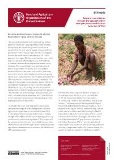
Ethiopia: Belgium's contribution through the Special Fund for Emergency and Rehabilitation Activities (SFERA)
03/2024
The lives and livelihoods of an estimated one million people in Ethiopia’s Tigray region have been severely disrupted by the recent drought in the north.
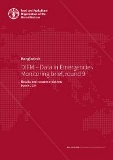
Bangladesh: DIEM – Data in Emergencies Monitoring brief, round 9
03/2024
This Data in Emergencies Monitoring (DIEM-Monitoring) brief shares the results of a ninth-round assessment conducted in November and December 2023 in Bangladesh.

Mali: Humanitarian Needs and Response Plan 2024
03/2024
Conflict and recurrent climate shocks continue to increase humanitarian needs across Mali.
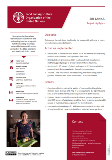
Sri Lanka: Project Highlights - OSRO/SRL/203/NZE
03/2024
The Government of New Zealand contributed USD 149 650 to the Food and Agriculture Organization of the United Nations to improve the nutritious food intake for households with one or more severely malnourished children in Monaragala and Nuwara Eliya districts of Sri Lanka.
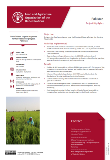
Pakistan: Project Highlights - UTF /PAK/165/PAK
03/2024
The Government of Pakistan, through the Asian Development Bank, contributed USD 5 million to the Food and Agriculture Organization of the United Nations to enhance the food security and rural livelihoods of flood-affected rice farming households in Pakistan’s Jaffarabad, Naseerabad, Sohbatpur and Usta Mohammad districts.
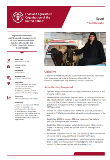
Egypt: Project Highlights - OSRO/EGY/102/CAN
03/2024
The Government of Canada contributed USD 2 174 100 to the Food and Agriculture Organization of the United Nations to improve the food security and nutrition of vulnerable rural women and their households in Egypt's Minya Governorate and help them build resilient livelihoods.

The Sudan: Humanitarian Needs and Response Plan 2024
03/2024
With conflict raging since April 2023, the Sudan has rapidly become the world’s largest internal displacement crisis.
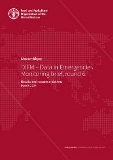
Mozambique: DIEM – Data in Emergencies Monitoring brief, round 6
03/2024
This Data in Emergencies Monitoring (DIEM-Monitoring) brief shares the results of a sixth-round assessment conducted in December 2023 and January 2024 in Mozambique.

Promoting the economic empowerment of rural women for improved food security and nutrition in the Niger
03/2024
The project was implemented using integrated approaches and community-based platforms – particularly Farmer Field Schools (FFS), Dimitra Clubs and local radio stations – which facilitate the empowerment and capacity building of rural women in vulnerable situations, as well as their access to and control of productive resources.
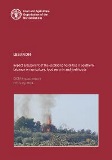
Lebanon: Impact assessment of the escalating hostilities in southern Lebanon on agriculture, food security and livelihoods
03/2024
The Food and Agriculture Organization of the United Nations (FAO), in partnership with the Ministry of Agriculture in Lebanon, conducted a household survey between 31 October and 30 November 2023 using computer-assisted telephone interviews.
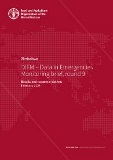
Zimbabwe: DIEM – Data in Emergencies Monitoring brief, round 9
02/2024
This Data in Emergencies Monitoring (DIEM-Monitoring) brief shares the results of a ninth-round assessment conducted in November and December 2023 in Zimbabwe.
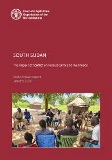
South Sudan: The impact of conflict on food security and livelihoods
02/2024
Food insecurity in South Sudan is driven by cascading shocks including conflict and insecurity, macro-economic crisis caused by the depreciation of the local currency, high inflation, conflict in the Sudan, climatic shocks (floods and dry spells), climate- and conflict-induced population displacement.
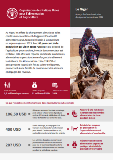
Niger: Humanitarian Needs Overview and Response Plan 2024
02/2024
In 2023, access to food emerged as the most pressing need for people in the Niger, where the impact of climate change and armed conflict continue to drive acute food insecurity.

Monitoring food security in Palestine and the Sudan: A joint FAO/WFP update for the members of the United Nations Security Council, February 2024. Issue No. 13 (Special edition)
02/2024
This is the thirteenth update of the Monitoring food security in food crisis countries and territories with conflict situations, jointly produced by the Food and Agriculture Organization of the United Nations (FAO) and the World Food Programme (WFP) to inform members of the United Nations Security Council (UNSC) on critical food crises driven by conflict and insecurity.

Syrian Arab Republic: Project profile
02/2024
The Food and Agriculture Organization of the United Nations is implementing a multiyear resilience project in six governorates in the Syrian Arab Republic with high levels of food insecurity.

Mali: DIEM – Data in Emergencies Monitoring brief, round 7
02/2024
This Data in Emergencies Monitoring (DIEM-Monitoring) brief shares the results of a seventh-round assessment conducted in December 2023 and January 2024 in Mali.

Viet Nam: Addressing negative socioeconomic impacts of the COVID-19 pandemic through social protection
02/2024
In late April 2021, Viet Nam faced its fourth wave of COVID-19, with over 895 000 new cases reported (FAO, 2022).

Emergency Management Centre: Achievements overview, November 2022–October 2023
02/2024
The Food and Agriculture Organization of the United Nations (FAO) Emergency Management Centre is a global centre that supports the management of One Health emergencies such as animal health and plant health.

Chad: Belgium's contribution through the Special Fund for Emergency and Rehabilitation Activities (SFERA)
02/2024
In Chad, about 2.9 million people are projected to experience high levels of acute food insecurity (Cadre Harmonisé Phase 3 and above) during the 2024 lean season and over 1.74 million children under 5 years of age will likely be acutely malnourished (October 2023–April 2024).
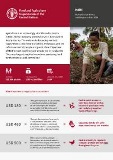
Haiti: Humanitarian Needs and Response Plan 2024
02/2024
Agriculture is an increasingly vital lifeline for people in Haiti. Rising insecurity and low harvests have pushed food prices up.
